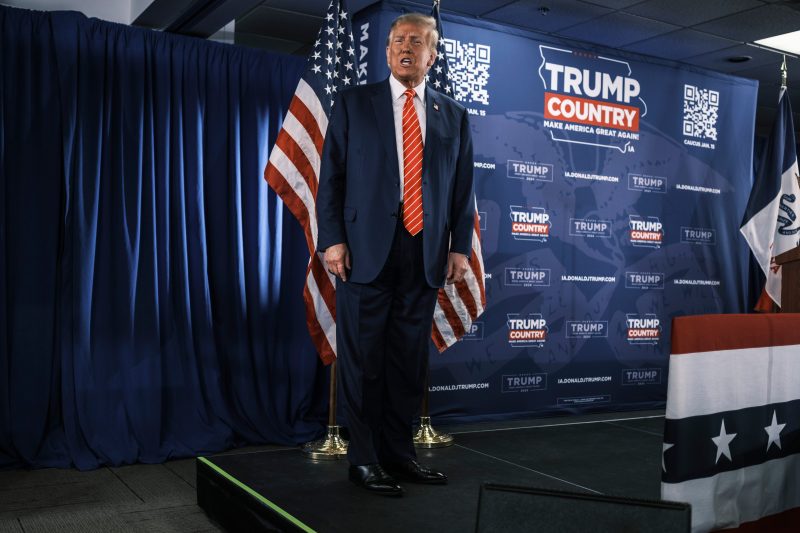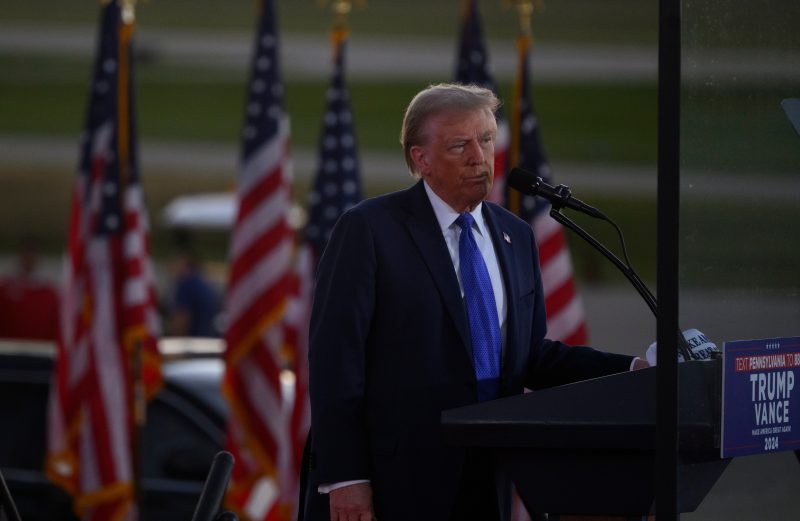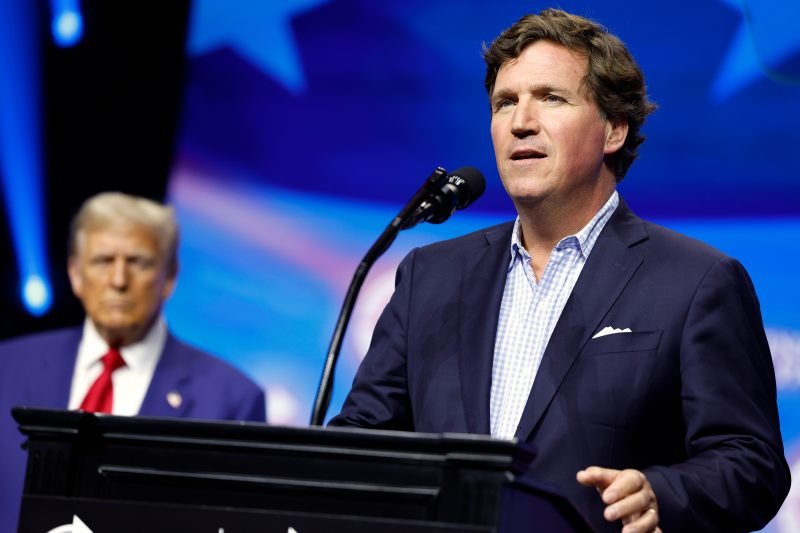Trump tries reappropriating ‘insurrection’ on Jan. 6 anniversary

Republican polling leader Donald Trump observed the third anniversary of the Jan. 6, 2021, attack on the U.S. Capitol by glorifying people charged in the riot, repeating baseless claims that left-wing or government interlopers caused the breach, and attempting to turn the term “insurrection” against his political opponents.
The remarks were part of an ongoing escalation of Trump’s and other Republicans’ efforts to minimize, justify and deny the violence of three years ago while also defending the Trump supporters who committed it. The former president, who was impeached for incitement of insurrection but acquitted in the Senate, has built a commanding lead in primary polls for the 2024 GOP nomination as Republicans have increasingly downplayed the attack and his role in it, according to a Washington Post-University of Maryland poll.
“He’s now directly saying that violence and criminality is okay if it’s in service of my power,” said Michael K. Miller, a political science professor at George Washington University who studies democracy and autocratic elections. “Once you endorse violence in rejecting electoral outcomes, you’ve turned away from democracy, it’s really that simple. Having a large fraction of the population with that attitude is very dangerous.”
Speaking at a campaign stop in Newton, Iowa, on Saturday, Trump referred to people detained while awaiting arraignment, trial or sentencing as “J6 hostages” and called their treatment “a horrible thing.”
Later Saturday, in Clinton, Iowa, he called on President Biden to release those who were detained. “You know what they ought to do?” Trump said. “They ought to release the J6 hostages. They’ve suffered enough. I call them hostages. Some people call them prisoners. I call them hostages. Release the J6 hostages, Joe. Release them, Joe. You can do it real easy, Joe.”
The former president on Saturday repeated the false claim that served as the stated basis of the efforts he and his allies waged to overturn the 2020 election, saying “it was a rigged.” Allegations focused on Trump’s actions in the aftermath of the election are at the center of some of the criminal charges he is facing in court.
He also called the U.S. House committee that investigated the attack “fake” and lashed out at its two Republican members, former representatives Liz Cheney (R-Wyo.) and Adam Kinzinger (R-Ill.). He also lashed out at Sen. Mitt Romney (R-Utah), who voted to convict Trump in both impeachments.
More than 1,000 people have been charged in connection with the breach of the Capitol three years ago. The Washington Post-UMD poll found that a majority of Americans believe the events of Jan. 6 were an attack on democracy and should never be forgotten.
But Trump has increasingly identified with the Jan. 6 defendants as he faces his own criminal jeopardy in four separate cases, including two involving his attempts to overturn the 2020 election. He has pledged to immediately pardon many Jan. 6 defendants if he returns to the White House. Last year, he recorded a song with some of the most violent accused offenders held in the D.C. jail and played it to open the first rally of his presidential campaign.
Biden’s reelection campaign is seeking to portray Trump as extreme and dangerous. In a speech Friday, he called him an ongoing threat to democracy, and an opening ad used footage of the Jan. 6 riot. Trump has responded by accusing Biden of distracting from his own presidential record. He has also tried to turn the criticism around, calling Biden a threat to democracy.
Trump went further in social media posts over the holidays, calling Biden an “insurrectionist” in response to a decision by the Colorado Supreme Court to remove Trump from the primary ballot under a provision of the 14th Amendment disqualifying officeholders who “engaged in insurrection or rebellion.” The U.S. Supreme Court agreed on Friday to review that decision in February.
On Saturday, Trump returned to the theme, concluding an extended broadside against undocumented immigration by saying, “When you talk about insurrection, what they’re doing, that’s the real deal.”
It’s the latest term that Trump has attempted to reappropriate and spin against his critics. In late 2016 and early 2017, Trump co-opted the term “fake news” — which meant hoax stories designed to monetize viral online traffic — to a catchall swipe at coverage he dislikes.
“He’s a master at undercutting and taking the zing out of phrases and terms that are used against him,” said Susan Stokes, director of the Chicago Center on Democracy at the University of Chicago. Stokes said Trump also undercuts criticism by making it into a joke, such as when he answered concerns last month that he would govern as a dictator by saying “Except for Day 1.”
In Clinton on Saturday, Trump recounted that exchange with Fox News host Sean Hannity, repeating, “I’m going to be a dictator for one day.”
In another example of that technique on Friday, Trump asked attendees at the rally in Sioux Center, Iowa, to raise their hands if they were not going to vote for him. Then he added: “No, don’t raise your hand, it could be dangerous. They’re going to say, ‘He incited an insurrection,’ these stupid bast—-. ‘He incited an insurrection.’”
The audience laughed.
In that speech, Trump also repeated baseless conspiracy theories blaming the violence on outside agitators or undercover agents rather than his own supporters. Despite contrary evidence from congressional reviews and more than 700 completed prosecutions, the Post-UMD poll found that a quarter of Americans believe the FBI “probably” or “definitely” instigated the Capitol attack.
“There was antifa and there was FBI,” Trump said in Sioux Center. “There were a lot of other people there, too, leading the charge.”
Trump’s lawyers have indicated in court filings that they want to make these conspiracy theories part of his defense against the federal criminal charges brought by special counsel Jack Smith involving Trump’s efforts to overturn the 2020 election.
Experts on democratic decline say flipping around warnings of undermining democracy serves to confuse, desensitize or disillusion voters.
“This is very common in polarized countries where a leader is autocratizing or eroding democracy using this terminology. They claim to be democracy’s biggest supporters,” said Jennifer McCoy, a political science professor at Georgia State University who studies the issue. “Unfortunately, he’s getting a lot of buy-in from both right-wing media and from his supporters. They’re believing this.”
Some Trump supporters at the venues where Trump was campaigning echoed the former president’s attempts to minimize or distort the Jan. 6 attack.
Among the hundreds of Trump fans filling the bleachers of the Clinton Middle School gymnasium ahead of Trump’s speech there on Saturday, Myrna Neumann, 80, rolled her eyes at the mention of the attack on the Capitol three years ago. “They try to make it a big deal,” she said of the media to her 81-year-old husband, Carl, beside her.
Neumann blamed the violence on Democrats in disguise and said the charges against Trump hardened her support for him. “It’s just another thing that makes us respect Trump more,” she said.
At Trump’s event in Newton, Shari Smith, 59, said she had seen videos of police opening doors for rioters (which happened in some instances after officers were overrun by the mob).
“I don’t think we’ve heard all of the truth of what happened,” she said. “I think it all got twisted.”
“It wasn’t an insurrection,” Glenn Bayles added in Newton, repeating the falsehood popular in right-wing media that there were no weapons at the riot. “There were some FBI undercover. I think it was all pretty much set up. … The only people that was really a threat to this democracy is the liberals and the Democrats who are in charge right now.”
Bill Halpin, 69, who said he had not yet decided who to caucus for in the GOP’s first nominating contest on Jan. 15, said Trump should have done more to call off the mob once the violence started.
“I don’t think it was an insurrection, so to speak. But it got out of hand,” he said. “And there was some people who did really stupid stuff and should have been arrested and put in jail.”
Many people are especially drawn to strong leaders making bold promises during times of tumult, McCoy said, and that may lead them to discount Trump’s own statements about how he would pardon rioters and punish his critics. Recognizing the dangers requires hearing from trusted authority figures in politics, faith, culture or civil society, she said.
“What it really takes is courage within that camp: Republican leaders with the courage to stand up, as some of them have done, obviously Liz Cheney, and they’ve been punished for doing do; that’s why it takes a tremendous amount of courage,” McCoy said. “Unfortunately, we don’t see this happening. This is why this year is going to be extremely important. It is going to be an election about democracy and how much the American public is willing to support democracy.”
In North Liberty, Iowa, a couple named Deb and Mark from Muscatine, who spoke on the condition that their last name not be used to talk more freely, said they voted for every Republican from Ronald Reagan to Mitt Romney but now identify as independents because they condemned Trump’s actions on Jan. 6.
“He sat there and ate the cheeseburger and did nothing. That is not a president that I want leading my country,” Deb said. “He has such a hold on the Republican Party that it’s scary.”
LeVine reported from Newton, Iowa. Meryl Kornfield in Clinton, Iowa, and Dylan Wells in North Liberty, Iowa, contributed to this report.



